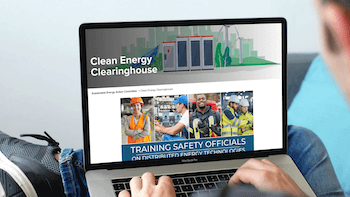
Three clean energy organizations have teamed up to offer training and educational resources on clean energy technologies to building managers, operators, and safety officers. The Interstate Renewable Energy Council and the New Buildings Institute, (NBI), have joined forces to offer these resources for safe and efficient deployment of distributed energy resources (DER). IREC, NBI and Southface Institute have launched CleanEnergyClearinghouse.org, an interactive learning resource providing unbiased educational resources on solar photovoltaics, electric vehicle supply equipment, battery storage, grid-interactive technologies, and highly efficient building materials.
Each month brings new clean energy resources online at an exponential pace. To support this growth, a skilled U.S. building workforce is required. This transition is being accelerated by federal, state, and local climate and greenhouse gas emission reduction goals. Building managers, safety officials, and building operators need to be aware of their roles in this transition.
The organizations are working in concert under the U.S. Department of Energy’s (DOE) Empowered program, which is funded by three technology offices within the Office of Energy Efficiency & Renewable Energy: Building Technologies Office (BTO), Solar Energy Technologies Office (SETO) and Vehicle Technologies Office (VTO). The partnership is an arrangement between the offices that draws on the unique skills of the staff to provide comprehensive resources that enable safe and efficient deployment of distributed energy resources.
“IREC is enthusiastic about this innovative collaboration under DOE leadership, which is consistent with our history of convening diverse stakeholders to tackle complex clean energy challenges,” says Larry Sherwood, IREC’s president and CEO. “Our collective action to accelerate clean energy adoption is needed to reach climate and equity goals.”
Since April 2021’s launch of the clearinghouse, more than 250,000 professionals have accessed educational resources. Southface hosted a series forums to gather feedback from stakeholders on the most pressing educational and training issues associated with these technologies.
“Building the infrastructure that a net zero future requires depends on a prepared and trained workforce,” comments Peter Carpenter, education project manager at Southface. “Relevant, accessible, timely educational materials and training will accelerate the adoption and implementation of renewable energy and energy efficiency in new and existing buildings, leading to the advancement of the nation’s energy security and efficiency goals.”
The project leaders gathered nearly 20 other clean energy organizations as additional collaborators. This collaboration facilitates knowledge exchange and will improve the implementation and efficiency of renewable energy and energy efficiency technologies across the U.S. Access to industry-vetted, fact-based educational resources and training that is relevant and responsive to rapid advances in distributed energy technologies is a benefit for professionals and the industry.
“When diverse and committed organizations collaborate, the combined effort exceeds expectations, and we all move closer to a 100 percent clean energy future that is reliable, resilient, and equitable,” states Madeline Salzman, the partnership’s manager at DOE.
“Working collaboratively with such a wide network of partners and stakeholders to close training gaps and other barriers to implementing distributed energy resources is allowing us to be agile in responding to changing industry needs,” mentions Diana Burk, project manager at NBI. “By cooperatively working to develop, test, and implement education and training, we are able to not only learn from each other, but also capitalize on the breadth of experience and knowledge across technologies and markets.”
The organizations have created interactive courses and resources on emerging clean energy technologies. The group will create a searchable database of model codes, permitting and inspection guides, and training for solar and storage.
Project partners include IREC, International Code Council (ICC), Slipstream, International Association of Electrical Inspectors (IAEI), National Association of State Fire Marshals (NASFM), Pacific Northwest National Laboratories (PNNL), Florida Solar Energy Center, NBI, International Code Council (ICC), Forth Mobility, Earth Advantage, Southwest Energy Efficiency Project (SWEEP), Metropolitan Area Planning Council, Southface, International Code Council (ICC), Slipstream, American Institute of Architects (AIA), Energy & Environmental Building Alliance (EEBA), Midwest Energy Efficiency Alliance (MEEA), and Southeast Energy Efficiency Alliance (SEEA).
